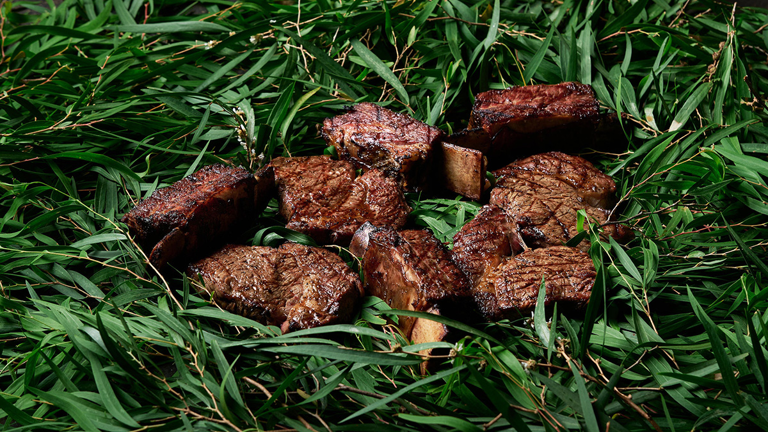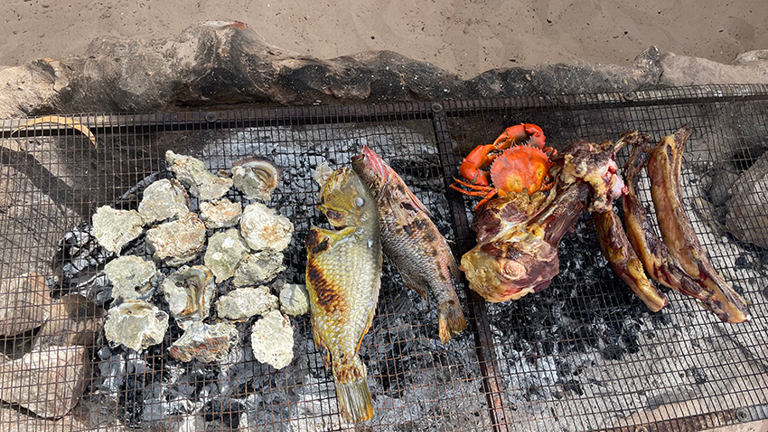Imagine taking your seat at a long, opulent dining table, eating fire-cooked meats and fresh saltwater food from the West Kimberley. This is Killa: Pindan to Plate.
Over eight meticulously crafted dishes, guests witness the full journey of the killa—Kimberley cattle taken straight from the bush, prepared with respect, and shared among families.
As plates of smoky pindan beef, saltwater delicacies, and honey-driven desserts arrive at the table, a story unfolds—one that interweaves Indigenous food traditions, the history of introduced species, and the deep cultural significance of sharing food on Country.
Curated by Bardi and Nyul Nyul man Chad Creighton and Emilia Galatis, Killa: Pindan to Plate is a collaboration between Kimberley communities, hunters, and artists, creating a dining experience that is as much about storytelling as it is about food.
For Mr Creighton, Killa is an opportunity to share the realities of life in the Kimberley, where hunting and cooking are deeply embedded in culture.
"We have a unique lifestyle," he said.
"There's a lot of Asian influence in our cooking, but we also hold onto the traditional ways our grandparents taught us. We wanted to bring all these elements together to show people what life is really like in the Kimberley."
The experience not only introduces guests to the flavors of the region but also highlights the deep respect Indigenous communities have for the land and its resources.
"Nothing goes to waste," Mr Creighton said.
"When we hunt a 'killa,' we use everything—the tongue, kidneys, heart, liver, intestines. It's a practice of respect, ensuring that every part of the animal serves a purpose."
"Usually, we hunt killa when there's a funeral coming up so we can feed many people. Our families are connected, and we always share. Killa goes a long way."

While Creighton provides the cultural framework for Killa, Ms Galatis brings a business perspective, challenging the way we think about food production and sustainability.
"There's a deep disconnect in Australia between what we consider 'acceptable' food and what we've been taught to consume by big business," she said.
"We're conditioned to think of nose-to-tail eating as grotesque, yet we have no problem with hormone-pumped, mass-packaged meat. Killa encourages diners to rethink their relationship with food, to embrace sustainability and seasonality, and to appreciate the Indigenous food traditions that have existed here for millennia."
She also highlights how Indigenous food knowledge has been largely overlooked in mainstream food industries.
"Out of the thousands of edible native ingredients in Australia, big business has chosen just 12 to commercialise,"she said.
"Even when people think they're engaging with Indigenous food, they're often consuming a narrative controlled by non-Indigenous businesses. Killa is about putting Indigenous knowledge, culture, and food sovereignty back in the hands of Indigenous people."
Every dish at Killa tells a story. From the smoky flavors of pindan beef to the salt-tinged essence of seafood cooked over open fire, the menu is designed to reflect life on Country.
"When we were filming up north, we cooked the way we always do—on fire," Mr Creighton said.
"The type of wood we use is carefully chosen; bloodwood for some meats, mangrove wood for seafood. These choices shape the flavours and bring out the natural elements of the ingredients."

For many, the experience is about more than just taste—it's about connecting with food on a deeper level.
"A lot of people have never had the experience of hunting their own food, let alone tasting a mud crab cooked fresh over coals," said Mr Creighton.
"It's about stripping away the artificial layers of how we consume food today and reconnecting with something raw, real, and deeply cultural."
Killa: Pindan to Plate is not just a culinary experience—it's a statement about food sovereignty, cultural storytelling, and sustainability. It asks guests to reconsider the way they eat, to embrace Indigenous food traditions, and to acknowledge the importance of respecting the land and its resources.
"Food is not just about eating—it's about community, sustainability, and honouring Country," said Mr Creighton.

